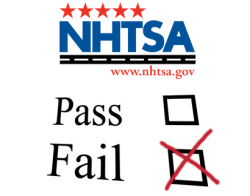
— The National Highway Traffic Safety Administration (NHTSA) received a failing grade in a 42-page report released by the U.S. Department of Transportation's Office of Inspector General. NHTSA knew the hammer was getting ready to fall when earlier this month it admitted it has failed the American driving public.
Now the inspector general audit has confirmed what many outside organizations--including CarComplaints.com and the Center for Auto Safety--have complained about for years: NHTSA has been letting auto manufacturers run the show.
Consumer Complaints Ignored
First there is the issue of consumer complaints. In what can only be considered as pathetic and damning, the report confirmed the very agency charged with evaluating consumer auto complaints wasn't even reading most of the complaints.
The report says NHTSA has ignored about 90 percent of the 330 complaints submitted daily from concerned consumers across the U.S. Screeners who do read the remaining complaints don't do a good job and although each person is told to look for problem trends, half said they don't.
Secondly, numerous problems have plagued NHTSA and how it handles consumer complaints, including the form used to make a complaint. The audit found many complaints don't include enough information for NHTSA to even know what system or part of a car has the problems.
Investigations
The staff of people who determines if an investigation should be conducted have received little or no training in their so-called areas of specialty. With the addition of the computer chip to vehicles, many of these areas are very technical and complex, yet the people have no training to handle complex subjects.
When deciding which safety problems to investigate, NHTSA employees have historically focused on issues that are most likely to result in recalls, even though the people doing this job are not trained for these responsibilities. Furthermore, when it's determined an investigation shouldn't be opened, NHTSA doesn't always document the justifications for its decisions not to open the investigation.
The report also concluded NHTSA staff are not properly trained or supervised to handle much of anything, and while a training plan is supposed to be in place, the plan has never been implemented.
GM Gets a Free Pass
The audit used the GM ignition switch failures as an example. In 2007, NHTSA considered a request to investigate airbags that failed to deploy in GM vehicles, but the agency decided against the investigation without saying why.
In the case of NHTSA not realizing and understanding millions of GM cars had defective ignition switches for over 10 years, the audit gives numerous examples of NHTSA's failures.
Just one example comes from June 2007, when GM provided NHTSA with a State trooper’s report that identified the 2005 Chevrolet Cobalt’s ignition switch as a possible cause of a person killed when the airbag failed to deploy. Two people at NHTSA reviewed the report in 2007, but they ignored the link between the ignition switch and airbag failure.
Additionally, and incredibly, NHTSA officials admitted they had no idea under what conditions the airbags were supposed to deploy.
Accountability
The report says NHTSA has repeatedly failed to hold automakers accountable for their actions and instead of doing its job, NHTSA applied an "honor system" to automakers. A good example is Honda and its actions concerning reporting death and injury claims in its vehicles.
Officials knew for years there were serious inconsistencies in early warning reports submitted by Honda, yet NHTSA ignored the problems until 2014. After complaints and prodding from the Center for Auto Safety, Honda finally admitted it failed to report 1,729 deaths and injuries for a period of 11 years.
It seems the NHTSA honor system didn't work out too well, and Honda was fined a total of $70 million for its failures.
The inspector general’s audit makes 17 recommendations for NHTSA to get its act together, something the agency said it will do by June 2016.
Read the report: Inadequate Data And Analysis Undermine NHTSA’s Efforts To Identify And Investigate Vehicle Safety Concerns.




